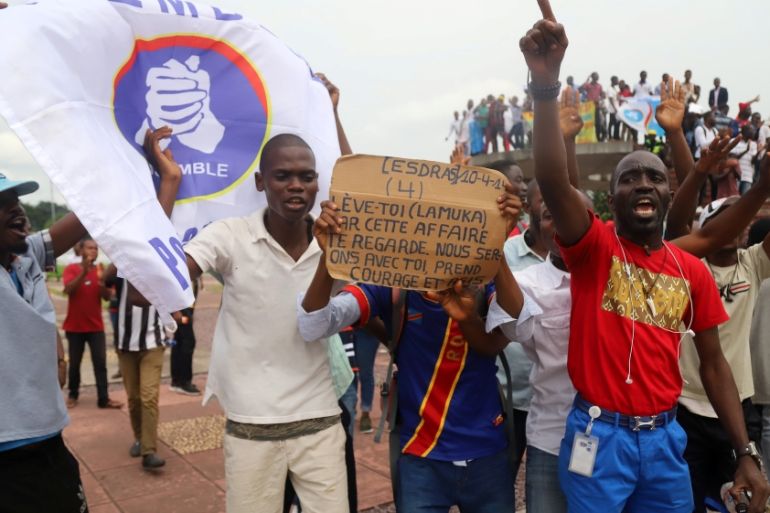DR Congo slams African Union’s call to suspend election result
Constitutional Court poised to rule on an appeal over the outcome of the elections held in December.

The Democratic Republic of the Congo (DRC) has rebuked the African Union (AU) over its calls to suspend the announcement of the final results of its presidential elections, insisting that the Constitutional Court assessing the vote’s legality was impartial.
The court will rule on Friday on an appeal filed by election runner-up Martin Fayulu – who says he was cheated of his victory in the December 30 election.
Keep reading
list of 4 itemsFull jury panel seated on third day of Trump’s New York hush-money trial
Jacob Zuma’s nine lives: How South Africa’s ex-president keeps coming back
A flash flood and a quiet sale highlight India’s Sikkim’s hydro problems
“The court is independent,” government spokesman Lambert Mende said on Friday. “I don’t think it is the business of the government or even of the African Union to tell the court what it should do.”
At a summit in Addis Ababa, AU leaders announced late on Thursday that the Union would dispatch envoys to Kinshasa in a bid to end the crisis.
AU commission chief Moussa Faki Mahamat and Rwanda’s President Paul Kagame, currently the AU chairman, are expected to fly in on Monday.
|
|
The summit also said there were “serious doubts” about the vote’s provisional results.
They called for the announcement of the final results to be suspended – a matter currently in the hands of the Constitutional Court, which must issue a ruling ahead of the scheduled swearing-in of the next president on Tuesday.
“I don’t know if there are countries where people can interfere like that in a legal procedure,” said Mende.
“The court will do what is right for showing the truth. We should all trust it.”
Appeal
On January 10, the electoral commission declared opposition leader Felix Tshisekedi provisional winner in the vote to choose a successor to outgoing President Joseph Kabila – with 38.57 percent of the vote against Fayulu’s 34.8 percent.
But Fayulu denounced the figures as an “electoral coup” forged by Tshisekedi and Kabila, and filed an appeal with the Constitutional Court a day later, claiming to have won 61 percent of the vote.
|
|
The Financial Times and other foreign media have reported seeing documents that confirm Fayulu as the winner.
“If the court declares Tshisekedi victor, the risk of isolation would be enormous and untenable for a country positioned right in the middle of the continent,” wrote Adeline Van Houtte of the Economist Intelligence Unit on Twitter.
Fayulu’s camp hailed the AU appeal for the final result to be put on hold, but Tshisekedi’s entourage lashed it as “scandalous”.
His lawyer and deputy chief of staff, Peter Kazadi, denounced the AU’s appeal as having “no legal basis”.
It was, he said, the result of manoeuvering by “a small number of countries”, which he did not name, and “shamed the institution” of the AU.
Fears of violence
The dispute has raised fears that the political crisis, which began when Kabila refused to step down at the end of his constitutional term in office two years ago, could turn into a bloodbath.
The vast and chronically unstable country has lived through two regional wars in 1996-1997 and 1998-2003, and the previous two elections, in 2006 and 2011, were marred by bloody clashes.
Since provisional results were released on January 10, at least 34 people have been killed, the United Nations said.
Its rights office in Congo also documented 59 people wounded along with 241 “arbitrary arrests”.